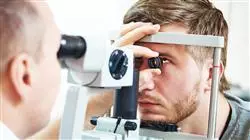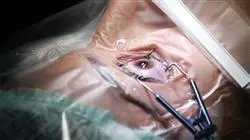University certificate
The world's largest faculty of medicine”
Introduction to the Program
Learn about the new developments in Macula, Retina and Vitreous Pathology and Surgery, and offer a more personalized care to your patients"

This Professional master’s degree in Macula, Retina and Vitreous Pathology and Surgery deals in depth with all the subspecialties of the retina, delving deeply into other major issues, such as AMD (Age-Related Macular Degeneration). In addition, the specific topics on surgery provide an additional value to this entire educational project, the main objective of which is to offer a high-level qualification to support the need for study of these professionals and increase their professional skills.
Specifically, this program deals exhaustively with diseases such as AMD, which has a wide repercussion in society and in daily life, or tumors, uveitis and infections, for which there is a scarce bibliographic reference, so a high-level qualification such as this will allow our students to obtain an advanced knowledge in this field.
Completion of the Professional master’s degree will give students the confidence they require for the full development of their profession, covering complex pathologies and surgical processes that they can subsequently develop in their daily clinical-surgical activity. It will also serve as a basis for further consultation in order to solve complex or doubtful cases in their daily work.
The Professional master’s degree has specialized teaching staff in ocular pathology and surgery, who contribute both their practical experience from their day-to-day work in private practice, as well as their long experience in teaching at a national and international level. In addition, it has the advantage of being a 100% online program, so the student can decide where and when they would like to study. This way, you will be able to flexibly self-manage your study hours.
This Professional master’s degree is the best option you can find to increase your knowledge in eye disease and give a boost to your professional career"
This Professional master’s degree in Macula, Retina and Vitreous Pathology and Surgery contains the most complete and up-to-date scientific program on the market. Its most notable features are:
- The development of more than 75 clinical cases presented by experts in ocular pathology and surgery
- The graphic, schematic, and practical contents with which they are created, provide scientific and practical information on the disciplines that are essential for professional practice
- The presentation of practical workshops on procedures and techniques
- An algorithm-based interactive learning system for decision-making in the clinical situations presented throughout the course
- Action protocols and clinical practice guidelines, which cover the most important latest developments in this specialist area
- Theoretical lessons, questions for experts, discussion forums on controversial issues and individual reflection work
- Special emphasis on test-based medicine and research methodologies
- Content that is accessible from any fixed or portable device with an Internet connection
This Professional master’s degree is the best investment you can make in a qualification to update your knowledge in Macula, Retina and Vitreous Pathology and Surgery"
The teaching staff includes a team of prestigious urologists, who bring their experience to this educational program, as well as renowned specialists from leading scientific societies.
The multimedia content, developed with the latest educational technology, will provide the professional with situated and contextual learning, i.e., a simulated environment that will provide an immersive training experience designed to train for real-life situations.
This program is designed around Problem-Based Learning, whereby the professional must try to solve the different professional practice situations that arise throughout the program. For this reason, you will be assisted by an innovative, interactive video system created by renowned and experienced experts in the field of Macula, Retina and Vitreous Pathology and Surgery with extensive teaching experience.
This 100% online Professional master’s degree will allow you to study from anywhere in the world. All you need is a computer or mobile device with an internet connection"

Our innovative teaching methodology will allow you to study as if you were dealing with real cases, and therefore increasing your training"
Why study at TECH?
TECH is the world’s largest online university. With an impressive catalog of more than 14,000 university programs available in 11 languages, it is positioned as a leader in employability, with a 99% job placement rate. In addition, it relies on an enormous faculty of more than 6,000 professors of the highest international renown.

Study at the world's largest online university and guarantee your professional success. The future starts at TECH”
The world’s best online university according to FORBES
The prestigious Forbes magazine, specialized in business and finance, has highlighted TECH as “the world's best online university” This is what they have recently stated in an article in their digital edition in which they echo the success story of this institution, “thanks to the academic offer it provides, the selection of its teaching staff, and an innovative learning method aimed at educating the professionals of the future”
A revolutionary study method, a cutting-edge faculty and a practical focus: the key to TECH's success.
The most complete study plans on the university scene
TECH offers the most complete study plans on the university scene, with syllabuses that cover fundamental concepts and, at the same time, the main scientific advances in their specific scientific areas. In addition, these programs are continuously being updated to guarantee students the academic vanguard and the most in-demand professional skills. In this way, the university's qualifications provide its graduates with a significant advantage to propel their careers to success.
TECH offers the most comprehensive and intensive study plans on the current university scene.
A world-class teaching staff
TECH's teaching staff is made up of more than 6,000 professors with the highest international recognition. Professors, researchers and top executives of multinational companies, including Isaiah Covington, performance coach of the Boston Celtics; Magda Romanska, principal investigator at Harvard MetaLAB; Ignacio Wistumba, chairman of the department of translational molecular pathology at MD Anderson Cancer Center; and D.W. Pine, creative director of TIME magazine, among others.
Internationally renowned experts, specialized in different branches of Health, Technology, Communication and Business, form part of the TECH faculty.
A unique learning method
TECH is the first university to use Relearning in all its programs. It is the best online learning methodology, accredited with international teaching quality certifications, provided by prestigious educational agencies. In addition, this disruptive educational model is complemented with the “Case Method”, thereby setting up a unique online teaching strategy. Innovative teaching resources are also implemented, including detailed videos, infographics and interactive summaries.
TECH combines Relearning and the Case Method in all its university programs to guarantee excellent theoretical and practical learning, studying whenever and wherever you want.
The world's largest online university
TECH is the world’s largest online university. We are the largest educational institution, with the best and widest online educational catalog, one hundred percent online and covering the vast majority of areas of knowledge. We offer a large selection of our own degrees and accredited online undergraduate and postgraduate degrees. In total, more than 14,000 university degrees, in eleven different languages, make us the largest educational largest in the world.
TECH has the world's most extensive catalog of academic and official programs, available in more than 11 languages.
Google Premier Partner
The American technology giant has awarded TECH the Google Google Premier Partner badge. This award, which is only available to 3% of the world's companies, highlights the efficient, flexible and tailored experience that this university provides to students. The recognition as a Google Premier Partner not only accredits the maximum rigor, performance and investment in TECH's digital infrastructures, but also places this university as one of the world's leading technology companies.
Google has positioned TECH in the top 3% of the world's most important technology companies by awarding it its Google Premier Partner badge.
The official online university of the NBA
TECH is the official online university of the NBA. Thanks to our agreement with the biggest league in basketball, we offer our students exclusive university programs, as well as a wide variety of educational resources focused on the business of the league and other areas of the sports industry. Each program is made up of a uniquely designed syllabus and features exceptional guest hosts: professionals with a distinguished sports background who will offer their expertise on the most relevant topics.
TECH has been selected by the NBA, the world's top basketball league, as its official online university.
The top-rated university by its students
Students have positioned TECH as the world's top-rated university on the main review websites, with a highest rating of 4.9 out of 5, obtained from more than 1,000 reviews. These results consolidate TECH as the benchmark university institution at an international level, reflecting the excellence and positive impact of its educational model.” reflecting the excellence and positive impact of its educational model.”
TECH is the world’s top-rated university by its students.
Leaders in employability
TECH has managed to become the leading university in employability. 99% of its students obtain jobs in the academic field they have studied, within one year of completing any of the university's programs. A similar number achieve immediate career enhancement. All this thanks to a study methodology that bases its effectiveness on the acquisition of practical skills, which are absolutely necessary for professional development.
99% of TECH graduates find a job within a year of completing their studies.
Professional Master's Degree in Macular, Retinal and Vitreous Pathology and Surgery
Some people, especially when they are over 50 years of age, present a particularity in the retina that may affect their vision. This is a tear in the center of the retina which, although it may initially appear asymptomatic, if left untreated, can cause metamorphopsia, macropsia, micropsia, Watzke-Allen's sign and even severe loss of sight. This rupture is known as macular hole and, in order to correct it, a surgical intervention is necessary. Here at TECH Global University we present the Professional Master's Degree in Pathology and Surgery of the Macula, Retina and Vitreous: a theoretical-practical tool of the most reliable academic rigor so that you can diagnose and solve this problem and many others like it, which involve precise ocular procedures. Few educational offerings provide the possibility of delving into the subspecialties of ophthalmology. Here we instruct you 100% online in one of the most advanced, with the latest scientific and technological innovations in the field. Do you want to be fully skilled in the improvement and visual restoration of patients with complex diseases? We make it easy for you.
Aspire to become a high-performance eye surgeon
Vitrectomy is a microincisional surgical technique through which the vitreous humor is replaced, which involves highly methodical action and care. The content provided by our program will not only train you in this procedure but also in a variety of others that will allow you to deal with pathologies such as cystoid macular edema, serpiginous choroiditis, uveitis, ocular leprosy, hereditary retinal dystrophies, albinism, among others. Supported by a team of ophthalmologists instructors of the highest level, we will even teach you about the control of intraocular hemorrhages during surgery and other complications related to retinal detachment, as well as notions on the latest advances in bionic artificial vision prostheses. Our methodology is designed so that you can access this content from any place and device that has an online connection, with total time flexibility, so you will be able to do other activities simultaneously. We encourage you to study with us and discover why we are globally trend by transforming graduates into true experts.







